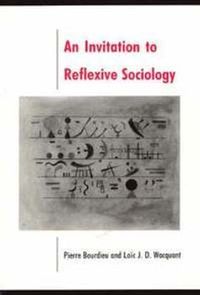
endast ny
Invitation to Reflexive Sociology
Over the last three decades, the French sociologist Pierre Bourdieu has produced one of the most imaginative and subtle bodies of social theory and research of the post war era. Yet, despite the influence of his work, no single introduction to his wide-ranging "oeuvre" is available. This book, intended for an English-speaking audience, offers a systematic and accessible overview, providing interpretive keys to the internal logic of Bourdieu's work by explicating thematic and methodological principles underlying his work. The structure of Bourdieu's theory of knowledge, practice, and society is first dissected by Loï c Wacquant; he then collaborates with Bourdieu in a dialogue in which they discuss central concepts of Bourdieu's work, confront the main objections and criticisms his work has met, and outline Bourdieu's views of the relation of sociology to philosophy, economics, history, and politics. The final section captures Bourdieu in action in the seminar room as he addresses the topic of how to practice the craft of reflexive sociology. Throughout, they stress Bourdieu's emphasis on reflexivity--his inclusion of a theory of intellectual practice as an integral component of a theory of society--and on method--particularly his manner of posing problems that permits a transfer of knowledge from one area of inquiry into another. Amplified by notes and an extensive bibliography, this synthetic view is essential reading for both students and advanced scholars. Pierre Bourdieu is Professor of Sociology at the Collè ge de France. Loï c J. D. Wacquant is a Junior Fellow, Society of Fellows, Harvard University.
Utgiven: 1992
ISBN: 9780226067414
Förlag: University of Chicago Press
Format: Häftad
Språk: Engelska
Sidor: 348 st
Over the last three decades, the French sociologist Pierre Bourdieu has produced one of the most imaginative and subtle bodies of social theory and research of the post war era. Yet, despite the influence of his work, no single introduction to his wide-ranging "oeuvre" is available. This book, intended for an English-speaking audience, offers a systematic and accessible overview, providing interpretive keys to the internal logic of Bourdieu's work by explicating thematic and methodological principles underlying his work. The structure of Bourdieu's theory of knowledge, practice, and society is first dissected by Loï c Wacquant; he then collaborates with Bourdieu in a dialogue in which they discuss central concepts of Bourdieu's work, confront the main objections and criticisms his work has met, and outline Bourdieu's views of the relation of sociology to philosophy, economics, history, and politics. The final section captures Bourdieu in action in the seminar room as he addresses the topic of how to practice the craft of reflexive sociology. Throughout, they stress Bourdieu's emphasis on reflexivity--his inclusion of a theory of intellectual practice as an integral component of a theory of society--and on method--particularly his manner of posing problems that permits a transfer of knowledge from one area of inquiry into another. Amplified by notes and an extensive bibliography, this synthetic view is essential reading for both students and advanced scholars. Pierre Bourdieu is Professor of Sociology at the Collè ge de France. Loï c J. D. Wacquant is a Junior Fellow, Society of Fellows, Harvard University.
Ny bok
598 kr629 kr
5% studentrabatt med Studentapan
Begagnad bok (0 st)
Varje vecka tillkommer tusentals nya säljare. Bevaka boken så får du meddelande när den finns tillgänglig igen.



